雅思英语测试题
雅思英语听说读写全面测试 选择题 65题
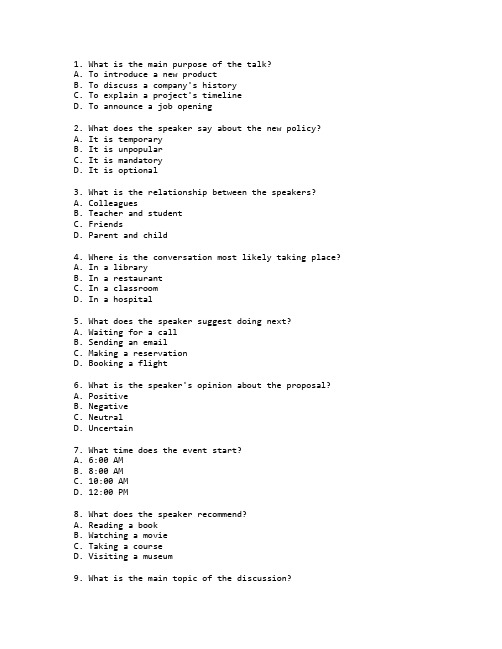
1. What is the main purpose of the talk?A. To introduce a new productB. To discuss a company's historyC. To explain a project's timelineD. To announce a job opening2. What does the speaker say about the new policy?A. It is temporaryB. It is unpopularC. It is mandatoryD. It is optional3. What is the relationship between the speakers?A. ColleaguesB. Teacher and studentC. FriendsD. Parent and child4. Where is the conversation most likely taking place?A. In a libraryB. In a restaurantC. In a classroomD. In a hospital5. What does the speaker suggest doing next?A. Waiting for a callB. Sending an emailC. Making a reservationD. Booking a flight6. What is the speaker's opinion about the proposal?A. PositiveB. NegativeC. NeutralD. Uncertain7. What time does the event start?A. 6:00 AMB. 8:00 AMC. 10:00 AMD. 12:00 PM8. What does the speaker recommend?A. Reading a bookB. Watching a movieC. Taking a courseD. Visiting a museum9. What is the main topic of the discussion?A. HealthB. TechnologyC. EducationD. Environment10. What does the speaker imply about the situation?A. It is improvingB. It is worseningC. It is stableD. It is unpredictable11. What is the speaker's main concern?A. SafetyB. CostC. QualityD. Efficiency12. What does the speaker want to know?A. The dateB. The locationC. The participantsD. The agenda13. What is the speaker's attitude towards the idea?A. SupportiveB. SkepticalC. IndifferentD. Critical14. What does the speaker mention as a possible solution?A. Hiring more staffB. Reducing hoursC. Increasing pricesD. Expanding services15. What is the speaker's final decision?A. To agreeB. To disagreeC. To postponeD. To reconsider#### 阅读部分(共20题)16. What is the main idea of the passage?A. The history of a cityB. The benefits of a dietC. The impact of technologyD. The challenges of climate change17. What does the author suggest about the topic?A. It is controversialB. It is widely acceptedC. It is misunderstoodD. It is irrelevant18. What is the tone of the article?A. OptimisticB. PessimisticC. InformativeD. Humorous19. What is the author's main argument?A. For changeB. Against changeC. For status quoD. Against status quo20. What does the passage imply about the future?A. UncertaintyB. ProgressC. DeclineD. Stability21. What is the purpose of the passage?A. To entertainB. To persuadeC. To informD. To criticize22. What is the main conflict in the story?A. Between two charactersB. Between a character and societyC. Between a character and natureD. Between a character and themselves23. What does the author conclude?A. A solutionB. A problemC. A questionD. A statement24. What is the main theme of the passage?A. LoveB. WarC. FreedomD. Justice25. What does the author recommend?A. A bookB. A courseC. A practiceD. A policy26. What is the main character's motivation?A. RevengeB. LoveC. AmbitionD. Fear27. What is the setting of the story?A. A cityB. A countrysideC. A desertD. An island28. What is the author's perspective on the issue?A. PositiveB. NegativeC. NeutralD. Mixed29. What is the main challenge faced by the protagonist?A. PhysicalB. MentalC. EmotionalD. Social30. What does the passage suggest about human nature?A. It is goodB. It is evilC. It is complexD. It is simple31. What is the main lesson of the story?A. To be braveB. To be kindC. To be wiseD. To be patient32. What is the author's main concern?A. EnvironmentB. EconomyC. EducationD. Ethics33. What is the main cause of the problem?A. Human errorB. Natural disasterC. Technological failureD. Political conflict34. What is the author's solution to the problem?A. A new lawB. A new technologyC. A new approachD. A new attitude35. What is the main impact of the event?A. PositiveB. NegativeC. NeutralD. Mixed#### 写作部分(共15题)36. What is the most important factor in a successful essay?A. OrganizationB. VocabularyC. GrammarD. Creativity37. What should be included in an introduction?A. Thesis statementB. ConclusionC. Personal opinionD. Detailed analysis38. What is the purpose of a thesis statement?A. To summarize the essayB. To introduce the topicC. To state the main argumentD. To provide background information39. What is the best way to develop a paragraph?A. By listing factsB. By using examplesC. By repeating ideasD. By asking questions40. What is the role of coherence in writing?A. To make the text interestingB. To make the text easy to readC. To make the text persuasiveD. To make the text creative41. What is the most effective way to conclude an essay?A. By restating the thesisB. By introducing new ideasC. By asking a questionD. By making a prediction42. What is the purpose of using transitions?A. To connect sentencesB. To emphasize pointsC. To add detailsD. To introduce new topics43. What is the best way to improve vocabulary?A. By reading extensivelyB. By memorizing wordsC. By using a dictionaryD. By taking vocabulary tests44. What is the most common error in student essays?A. Spelling mistakesB. Grammatical errorsC. Lack of evidenceD. Poor structure45. What is the purpose of a topic sentence?A. To introduce the paragraphB. To summarize the paragraphC. To state the main ideaD. To conclude the paragraph46. What is the best way to avoid plagiarism?A. By using quotesB. By paraphrasingC. By citing sourcesD. By summarizing47. What is the most important skill in academic writing?A. CreativityB. PersuasionC. AnalysisD. Description48. What is the purpose of an outline?A. To organize ideasB. To write the essayC. To revise the essayD. To edit the essay49. What is the best way to revise an essay?A. By reading it aloudB. By asking for feedbackC. By checking grammarD. By adding more details50. What is the most effective way to use evidence in an essay?A. To support the thesisB. To introduce the topicC. To summarize the essayD. To conclude the essay#### 口语部分(共15题)51. What is the best way to start a conversation?A. By asking a questionB. By making a statementC. By introducing yourselfD. By complimenting the other person52. What is the most important aspect of a presentation?A. ContentB. DeliveryC. AppearanceD. Timing53. What should you do if you forget what to say during a presentation?A. Pause and thinkB. Skip the pointC. Admit the mistakeD. Continue without missing a beat54. What is the best way to handle nervousness before speaking?A. Practice moreB. Take deep breathsC. Focus on the audienceD. Think positively55. What is the purpose of using gestures in speech?A. To emphasize pointsB. To entertain the audienceC. To fill pausesD. To look confident56. What is the most effective way to respond to a question in a debate?A. By agreeingB. By disagreeingC. By clarifying the questionD. By ignoring the question57. What is the best way to make a speech interesting?A. By using humorB. By using statisticsC. By using personal storiesD. By using quotes58. What is the most important skill in public speaking?A. ConfidenceB. ClarityC. CreativityD. Persuasion59. What is the purpose of eye contact in a conversation?A. To show interestB. To avoid distractionsC. To look confidentD. To end the conversation60. What is the best way to handle a difficult question in an interview?A. By answering honestlyB. By avoiding the questionC. By asking for clarificationD. By changing the topic61. What is the most important factor in a successful interview?A. PreparationB. AppearanceC. ConfidenceD. Experience62. What is the best way to end a conversation?A. By summarizing the pointsB. By asking a final questionC. By thanking the other personD. By making a joke63. What is the purpose of a rehearsal in public speaking?A. To memorize the speechB. To practice deliveryC. To check the timingD. To prepare the audience64. What is the most effective way to handle criticism in a speech?A. By accepting itB. By denying itC. By explaining your pointD. By ignoring it65. What is the best way to improve speaking skills?A. By watching videosB. By reading booksC. By practicing regularlyD. By taking courses### 答案1. C2. C3. A4. B5. C6. A7. B8. C9. D10. A11. B12. D13. B14. A15. C16. D17. A18. C19. A20. B21. C22. B23. A24. C25. D26. C27. A28. B29. B30. C31. D32. A33. A34. C35. B36. A37. A38. C39. B40. B41. A42. A43. A44. B45. C46. C47. C48. A49. B50. A51. A52. B53. A54. B55. A56. C57. C58. A59. A60. C61. A62. C63. B64. A65. C。
雅思单词性格测试题及答案
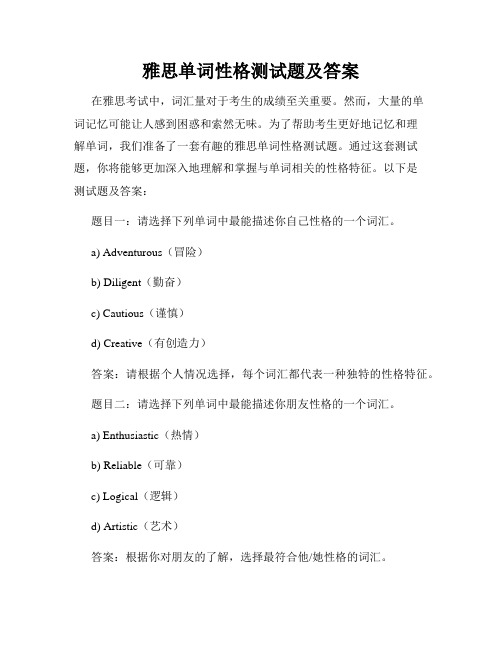
雅思单词性格测试题及答案在雅思考试中,词汇量对于考生的成绩至关重要。
然而,大量的单词记忆可能让人感到困惑和索然无味。
为了帮助考生更好地记忆和理解单词,我们准备了一套有趣的雅思单词性格测试题。
通过这套测试题,你将能够更加深入地理解和掌握与单词相关的性格特征。
以下是测试题及答案:题目一:请选择下列单词中最能描述你自己性格的一个词汇。
a) Adventurous(冒险)b) Diligent(勤奋)c) Cautious(谨慎)d) Creative(有创造力)答案:请根据个人情况选择,每个词汇都代表一种独特的性格特征。
题目二:请选择下列单词中最能描述你朋友性格的一个词汇。
a) Enthusiastic(热情)b) Reliable(可靠)c) Logical(逻辑)d) Artistic(艺术)答案:根据你对朋友的了解,选择最符合他/她性格的词汇。
题目三:请选出下列单词中与你的性格特点相对应的一个词汇。
a) Introverted(内向)b) Extroverted(外向)c) Analytical(分析型)d) Intuitive(直觉型)答案:根据个人的特点选择最符合自己性格的词汇。
题目四:请选出下列单词中与你的学习方式相对应的一个词汇。
a) Methodical(有条理)b) Spontaneous(自发)c) Rational(理性)d) Imaginative(富有想象力)答案:根据个人的学习方式选择最符合自己的词汇。
题目五:请选出下列单词中最能描述你适应环境的能力的一个词汇。
a) Adaptive(适应性强)b) Persistent(坚持不懈)c) Discerning(有洞察力)d) Inventive(有创造性)答案:根据个人的情况选择最符合自己的词汇。
答案解析:以上题目只是对常见单词和性格特征的一个简要描述,每个人的具体情况各不相同。
根据你的选择,我们可以初步了解你在某些方面的性格倾向。
雅思英语考试试题
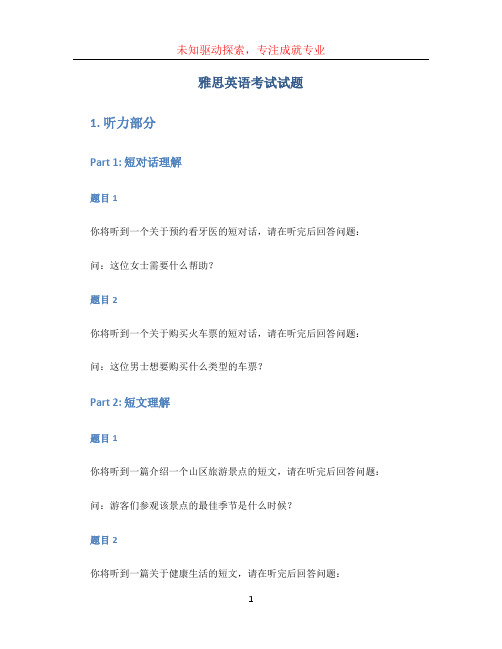
雅思英语考试试题1. 听力部分Part 1: 短对话理解题目1你将听到一个关于预约看牙医的短对话,请在听完后回答问题:问:这位女士需要什么帮助?题目2你将听到一个关于购买火车票的短对话,请在听完后回答问题:问:这位男士想要购买什么类型的车票?Part 2: 短文理解题目1你将听到一篇介绍一个山区旅游景点的短文,请在听完后回答问题:问:游客们参观该景点的最佳季节是什么时候?题目2你将听到一篇关于健康生活的短文,请在听完后回答问题:问:作者建议每天应该至少锻炼多久?2. 阅读部分Passage 1: 文章阅读请阅读下面的文章,并回答问题:文章:雅思考试是全球英语水平考试中最著名的一项,由英国文化协会、剑桥英语考试委员会和IDP教育澳大利亚联合主办。
雅思考试涵盖听力、阅读、写作和口语四个部分,旨在考察考生的英语沟通能力。
许多留学生和移民申请者必须通过雅思考试来证明自己的英语水平。
如果你打算申请留学或移民,那么雅思考试的成绩将是你重要的参考依据之一。
问题1:雅思考试涵盖哪些部分?问题2:雅思考试的成绩对留学和移民申请者有什么作用?Passage 2: 阅读理解请阅读下面的短文,并回答问题:短文:雅思考试的阅读部分是考生中最令人头疼的一部分。
阅读理解要求考生在有限的时间内阅读一段文章,并回答相关问题。
因此,考生需要具备良好的阅读理解能力和快速阅读的技巧。
建议考生在备考期间多进行模拟题训练,并时常阅读英文文章以提高阅读速度和理解能力。
问题1:雅思考试的阅读部分要求考生做什么?问题2:考生如何提高阅读速度和理解能力?3. 写作部分题目1雅思写作部分要求考生在有限的时间内完成一篇独立写作。
请根据以下题目,用150字至250字回答:题目:你认为应该通过什么方式来保护环境?题目2雅思写作部分还要求考生在有限的时间内完成一篇对比/说明文。
请根据以下题目,用250字至300字回答:题目:比较城市生活和乡村生活,你更喜欢哪一种?为什么?4. 口语部分Part 1: 日常对话请准备对以下问题做出回答:问题1:你平时喜欢做什么运动?问题2:你喜欢吃什么类型的食物?Part 2: 个人陈述请准备一个关于自己的个人陈述并在2分钟内自我介绍。
雅思考试试题及答案

雅思考试试题及答案雅思考试是世界上最受欢迎的英语语言测试之一,每年都有数百万的考生参加。
考试由国际英语语言测试系统(IELTS)主办,旨在评估考生在听力、阅读、写作和口语四个方面的英语能力。
下面是一些常见的雅思考试试题及答案,希望能对考生们有所帮助。
听力试题及答案听力部分是雅思考试的第一部分,考生需要通过听录音回答问题。
以下是一道常见的听力试题及其答案:Question: What does the speaker say about the weather forecast for tomorrow?a) It will be sunny.b) It will rain in the morning and be sunny in the afternoon.c) It will be windy.d) It will snow.Answer: b) It will rain in the morning and be sunny in the afternoon.阅读试题及答案阅读部分是雅思考试的第二部分,考生需要阅读一篇文章,并回答相关问题。
以下是一道常见的阅读试题及其答案:Question: According to the passage, what are the benefits of regular exercise?a) It can improve cardiovascular health.b) It can help reduce stress.c) It can boost immunity.d) All of the above.Answer: d) All of the above.写作试题及答案写作部分是雅思考试的第三部分,考生需要根据给定的题目,撰写一篇短文。
以下是一道常见的写作试题及其答案:Question: In many countries, teenagers are expected to do unpaid work in the community. Do you think this is a good idea?Answer: Personally, I believe that it is a good idea for teenagers to do unpaid work in the community. Firstly, it can help them develop a sense of responsibility and empathy towards others. Secondly, it provides them with valuable life experiences and skills that can benefit them in the future. Finally, it promotes active citizenship and contributes to the overall betterment of the community.口语试题及答案口语部分是雅思考试的最后一部分,考生需要回答面试官提出的问题。
雅思英语测试题及答案

雅思英语测试题及答案一、听力部分1. 根据所听对话,选择正确答案。
A. 会议将在下午举行。
B. 会议将在上午举行。
C. 会议已被取消。
答案:B2. 根据所听短文,选择正确答案。
A. 学生需要完成一个项目。
B. 学生需要提交一篇论文。
C. 学生需要参加一个考试。
答案:A二、阅读部分1. 阅读以下段落,选择正确答案。
"The environmental impact of the new factory is expectedto be minimal, as it will utilize the latest technology in energy conservation."A. The factory will have a significant impact on the environment.B. The factory will use old technology.C. The factory will have a small effect on the environment.答案:C2. 阅读以下句子,选择正确答案。
"Despite the heavy rain, the concert was not cancelled."A. The concert was cancelled due to the rain.B. The concert was cancelled for other reasons.C. The concert continued despite the weather.答案:C三、写作部分1. 根据以下提示,写一篇不少于150字的短文。
提示:描述你最喜欢的季节,并解释为什么。
答案示例:我最喜欢的季节是秋天。
秋天的天气凉爽宜人,树叶变得五彩斑斓,给人一种宁静和收获的感觉。
此外,秋天也是许多水果和蔬菜成熟的季节,我可以享受到各种美味的农产品。
雅思英语口语与听力能力测试 选择题 60题

1. What is the main topic of the conversation?A. Travel plansB. Restaurant reviewC. Movie discussionD. Book club meeting2. Where does the conversation take place?A. At a libraryB. In a caféC. At a bus stationD. In a classroom3. What time is mentioned in the conversation?A. 9:00 AMB. 10:30 AMC. 12:00 PMD. 2:00 PM4. Who is the conversation mainly between?A. Two friendsB. A customer and a waiterC. A teacher and a studentD. A doctor and a patient5. What does the speaker suggest doing?A. Going to the cinemaB. Visiting a museumC. Attending a concertD. Having a picnic6. What is the relationship between the speakers?A. ColleaguesB. SiblingsC. NeighborsD. Classmates7. What is the main problem discussed in the conversation?A. A lost itemB. A scheduling conflictC. A health issueD. A financial problem8. What is the speaker's opinion about the topic?A. PositiveB. NegativeC. NeutralD. Indifferent9. What does the speaker want to know?A. DirectionsB. PricesC. AvailabilityD. Recommendations10. What is the final decision made in the conversation?A. To rescheduleB. To cancelC. To proceed as plannedD. To reconsider第11-20题11. What is the speaker's occupation?A. TeacherB. DoctorC. EngineerD. Artist12. What is the purpose of the conversation?A. To make a reservationB. To discuss a projectC. To plan a tripD. To solve a problem13. What is the speaker's favorite activity?A. ReadingB. CookingC. HikingD. Swimming14. What is the speaker's opinion about the weather?A. It's too hotB. It's too coldC. It's perfectD. It's unpredictable15. What is the speaker's suggestion for improvement?A. More staffB. Better equipmentC. Increased budgetD. Additional training16. What is the speaker's experience level?A. BeginnerB. IntermediateC. AdvancedD. Expert17. What is the speaker's main concern?B. CostC. TimeD. Quality18. What is the speaker's preferred method of communication?A. EmailB. Phone callC. Text messageD. Face-to-face19. What is the speaker's expectation?A. Immediate responseB. Detailed informationC. Personal attentionD. Quick resolution20. What is the speaker's plan for the weekend?A. Relaxing at homeB. Going out with friendsC. Working on a projectD. Attending a workshop第21-30题21. What is the speaker's nationality?A. AmericanB. BritishC. AustralianD. Canadian22. What is the speaker's favorite food?A. ItalianB. ChineseC. MexicanD. Indian23. What is the speaker's favorite movie genre?A. ActionB. ComedyC. DramaD. Sci-fi24. What is the speaker's favorite book genre?A. FictionB. Non-fictionC. MysteryD. Romance25. What is the speaker's favorite sport?B. BasketballC. TennisD. Golf26. What is the speaker's favorite holiday?A. ChristmasB. ThanksgivingC. HalloweenD. Easter27. What is the speaker's favorite music genre?A. PopB. RockC. JazzD. Classical28. What is the speaker's favorite place to visit?A. BeachB. MountainsC. CityD. Countryside29. What is the speaker's favorite season?A. SpringB. SummerC. AutumnD. Winter30. What is the speaker's favorite animal?A. DogB. CatC. HorseD. Bird口语部分第31-40题31. Describe your favorite place to relax.A. A quiet parkB. A cozy caféC. A sunny beachD. A peaceful library32. What do you do to stay healthy?A. Exercise regularlyB. Eat a balanced dietC. Get enough sleepD. Practice mindfulness33. What is your opinion on technology in education?A. Very beneficialB. Somewhat helpfulC. Mostly distractingD. Completely unnecessary34. Describe a memorable trip you have taken.A. A weekend getawayB. A family vacationC. A solo adventureD. A business trip35. What is your favorite way to spend a free day?A. Reading a bookB. Watching moviesC. Exploring new placesD. Trying new foods36. What is your opinion on social media?A. Very positiveB. Somewhat negativeC. Mostly neutralD. Completely indifferent37. Describe a challenge you have faced and how you overcame it.A. Academic difficultyB. Personal lossC. Professional setbackD. Health issue38. What is your favorite type of music and why?A. Pop for its catchy tunesB. Rock for its energyC. Classical for its eleganceD. Jazz for its improvisation39. What is your opinion on the importance of learning a second languag e?A. Very importantB. Somewhat usefulC. Mostly unnecessaryD. Completely irrelevant40. Describe a time when you helped someone.A. Offering adviceB. Providing supportC. Sharing resourcesD. Teaching a skill第41-50题41. What is your favorite childhood memory?A. A family tripB. A birthday partyC. A school eventD. A holiday celebration42. What is your opinion on the impact of climate change?A. Very concerningB. Somewhat manageableC. Mostly exaggeratedD. Completely irrelevant43. Describe a skill you would like to learn.A. Playing a musical instrumentB. Speaking a foreign languageC. Cooking a new cuisineD. Practicing a sport44. What is your favorite way to unwind after a long day?A. Watching TVB. Listening to musicC. Taking a walkD. Reading a book45. What is your opinion on the importance of art in society?A. Very importantB. Somewhat usefulC. Mostly unnecessaryD. Completely irrelevant46. Describe a time when you felt proud of yourself.A. Achieving a goalB. Overcoming a fearC. Helping someoneD. Learning a new skill47. What is your favorite type of book and why?A. Fiction for its creativityB. Non-fiction for its knowledgeC. Mystery for its suspenseD. Romance for its emotion48. What is your opinion on the role of government in education?A. Very importantB. Somewhat usefulC. Mostly unnecessaryD. Completely irrelevant49. Describe a time when you had to be brave.A. Standing up for someoneB. Confronting a problemC. Trying something newD. Overcoming a challenge50. What is your favorite way to celebrate a special occasion?A. Having a partyB. Going out to eatC. TravelingD. Spending time with family第51-60题51. What is your opinion on the importance of family?A. Very importantB. Somewhat usefulC. Mostly unnecessaryD. Completely irrelevant52. Describe a time when you learned something unexpected.A. From a bookB. From a conversationC. From an experienceD. From a mistake53. What is your favorite type of movie and why?A. Action for its excitementB. Comedy for its humorC. Drama for its depthD. Sci-fi for its imagination54. What is your opinion on the importance of volunteering?A. Very importantB. Somewhat usefulC. Mostly unnecessaryD. Completely irrelevant55. Describe a time when you had to make a difficult decision.A. Choosing a careerB. Ending a relationshipC. Moving to a new placeD. Pursuing a dream56. What is your favorite way to learn new things?A. Reading booksB. Watching videosC. Attending classesD. Practicing hands-on57. What is your opinion on the importance of cultural diversity?A. Very importantB. Somewhat usefulC. Mostly unnecessaryD. Completely irrelevant58. Describe a time when you had to be patient.A. Waiting for a resultB. Dealing with a slow processC. Supporting a friendD. Overcoming a delay59. What is your favorite type of food and why?A. Italian for its varietyB. Chinese for its flavorsC. Mexican for its spicesD. Indian for its richness60. What is your opinion on the importance of lifelong learning?A. Very importantB. Somewhat usefulC. Mostly unnecessaryD. Completely irrelevant答案1. A2. B3. C4. A5. D6. B7. C8. A9. D10. C11. B12. A13. C14. B15. D16. A17. C18. B19. D20. A21. C22. B23. D24. A25. C26. B27. D28. A29. C30. B31. D32. A33. B34. C35. D36. A37. B38. C39. A40. D41. B42. A43. C44. D45. A46. B47. C48. A49. D50. B51. A52. C53. B54. A55. D56. C57. A58. B59. D60. A。
雅思英语学术阅读与写作测试 选择题 60题
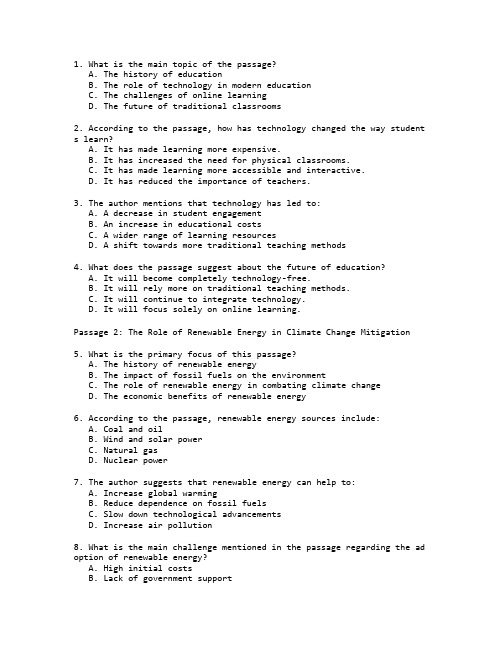
1. What is the main topic of the passage?A. The history of educationB. The role of technology in modern educationC. The challenges of online learningD. The future of traditional classrooms2. According to the passage, how has technology changed the way student s learn?A. It has made learning more expensive.B. It has increased the need for physical classrooms.C. It has made learning more accessible and interactive.D. It has reduced the importance of teachers.3. The author mentions that technology has led to:A. A decrease in student engagementB. An increase in educational costsC. A wider range of learning resourcesD. A shift towards more traditional teaching methods4. What does the passage suggest about the future of education?A. It will become completely technology-free.B. It will rely more on traditional teaching methods.C. It will continue to integrate technology.D. It will focus solely on online learning.Passage 2: The Role of Renewable Energy in Climate Change Mitigation5. What is the primary focus of this passage?A. The history of renewable energyB. The impact of fossil fuels on the environmentC. The role of renewable energy in combating climate changeD. The economic benefits of renewable energy6. According to the passage, renewable energy sources include:A. Coal and oilB. Wind and solar powerC. Natural gasD. Nuclear power7. The author suggests that renewable energy can help to:A. Increase global warmingB. Reduce dependence on fossil fuelsC. Slow down technological advancementsD. Increase air pollution8. What is the main challenge mentioned in the passage regarding the ad option of renewable energy?A. High initial costsB. Lack of government supportC. Inadequate technological developmentD. Public resistancePassage 3: The Evolution of Urban Planning9. What does the passage mainly discuss?A. The history of urban planningB. The impact of urban planning on the environmentC. The future of rural areasD. The role of architects in city development10. According to the passage, urban planning has evolved to focus more on:A. Historical preservationB. Economic growthC. Sustainable developmentD. Population control11. The author mentions that modern urban planning aims to:A. Increase traffic congestionB. Promote unsustainable practicesC. Create livable and environmentally friendly citiesD. Reduce the availability of public spaces12. What does the passage suggest about the future of urban planning?A. It will focus on reducing city size.B. It will become less important.C. It will continue to prioritize sustainability.D. It will ignore environmental concerns.写作部分Question 1: Do you agree or disagree with the following statement? Tech nology has made our lives more complicated rather than easier.13. The author's view on technology making lives more complicated is pr imarily based on:A. Increased efficiencyB. Greater convenienceC. More distractionsD. Enhanced communication14. The author argues that technology has led to:A. A decrease in work-life balanceB. An increase in personal freedomC. A simpler lifestyleD. More meaningful relationships15. According to the author, the main drawback of technology is:A. Its costB. Its complexityC. Its impact on social interactionsD. Its role in economic growth16. The author suggests that to make technology less complicated, we sh ould:A. Use it less frequentlyB. Invest in more advanced technologyC. Focus on its benefitsD. Limit its applicationsQuestion 2: Discuss the impact of globalization on cultural diversity.17. The author believes that globalization has:A. Preserved cultural diversityB. Eroded cultural diversityC. Ignored cultural diversityD. Enhanced cultural diversity18. According to the author, the main benefit of globalization is:A. Economic growthB. Cultural homogenizationC. Increased cultural awarenessD. Reduced cultural exchange19. The author mentions that globalization can lead to:A. A loss of local traditionsB. A greater appreciation of local traditionsC. A decrease in international tradeD. An increase in cultural isolation20. The author suggests that to maintain cultural diversity, we should:A. Isolate ourselves from global influencesB. Promote cultural exchangeC. Ignore global trendsD. Focus solely on local culturesQuestion 3: Analyze the effects of social media on interpersonal relati onships.21. The author argues that social media has:A. Strengthened interpersonal relationshipsB. Weakened interpersonal relationshipsC. Had no impact on interpersonal relationshipsD. Improved communication skills22. According to the author, the main advantage of social media is:A. Increased privacyB. Enhanced social interactionC. Reduced face-to-face communicationD. Greater anonymity23. The author mentions that social media can lead to:A. A decrease in real-life interactionsB. An increase in community involvementC. A greater sense of belongingD. More meaningful relationships24. The author suggests that to improve interpersonal relationships, we should:A. Use social media lessB. Focus on online interactionsC. Balance online and offline interactionsD. Ignore social media entirelyQuestion 4: Evaluate the role of government in promoting public health.25. The author believes that the government's role in promoting public health is:A. InsignificantB. CrucialC. LimitedD. Counterproductive26. According to the author, the main responsibility of the government in public health is:A. Funding private healthcareB. Implementing health policiesC. Promoting unhealthy lifestylesD. Reducing healthcare costs27. The author mentions that government initiatives can lead to:A. A decrease in public health awarenessB. An increase in healthcare costsC. Improved public health outcomesD. Greater reliance on private healthcare28. The author suggests that to effectively promote public health, the government should:A. Reduce its involvementB. Increase funding for healthcareC. Focus on individual responsibilityD. Collaborate with healthcare providersQuestion 5: Assess the impact of climate change on global agriculture.29. The author argues that climate change has:A. No impact on agricultureB. A positive impact on agricultureC. A negative impact on agricultureD. A neutral impact on agriculture30. According to the author, the main challenge posed by climate change to agriculture is:A. Increased crop yieldsB. Reduced water availabilityC. Improved soil qualityD. Greater biodiversity31. The author mentions that climate change can lead to:A. A decrease in food productionB. An increase in agricultural productivityC. A shift towards more sustainable farming practicesD. Greater reliance on synthetic fertilizers32. The author suggests that to mitigate the impact of climate change o n agriculture, we should:A. Ignore environmental concernsB. Invest in climate-resistant cropsC. Focus on reducing agricultural outputD. Promote industrial farming methodsQuestion 6: Examine the relationship between education and economic dev elopment.33. The author believes that education is:A. Irrelevant to economic developmentB. A key driver of economic developmentC. A hindrance to economic developmentD. A minor factor in economic development34. According to the author, the main benefit of education for economic development is:A. Increased government spendingB. Improved workforce skillsC. Reduced unemployment ratesD. Greater consumer spending35. The author mentions that education can lead to:A. A decrease in economic growthB. An increase in poverty levelsC. Enhanced innovation and productivityD. Greater income inequality36. The author suggests that to promote economic development, we should:A. Reduce investment in educationB. Focus on short-term economic gainsC. Invest in quality educationD. Prioritize industrial growthQuestion 7: Discuss the role of innovation in business success.37. The author argues that innovation is:A. Unnecessary for business successB. Essential for business successC. A minor factor in business successD. A hindrance to business success38. According to the author, the main advantage of innovation in busine ss is:A. Increased costsB. Enhanced competitivenessC. Reduced market shareD. Greater reliance on traditional methods39. The author mentions that innovation can lead to:A. A decrease in business profitabilityB. An increase in market dominanceC. A shift towards more conservative strategiesD. Greater resistance to change40. The author suggests that to achieve business success, companies sho uld:A. Avoid innovationB. Embrace continuous innovationC. Focus on cost-cutting measuresD. Prioritize market stabilityQuestion 8: Analyze the impact of immigration on host countries.41. The author believes that immigration has:A. No impact on host countriesB. A positive impact on host countriesC. A negative impact on host countriesD. A mixed impact on host countries42. According to the author, the main benefit of immigration for host c ountries is:A. Increased unemploymentB. Enhanced cultural diversityC. Reduced economic growthD. Greater social tension43. The author mentions that immigration can lead to:A. A decrease in population diversityB. An increase in economic opportunitiesC. A shift towards more homogeneous societiesD. Greater resistance to cultural exchange44. The author suggests that to maximize the benefits of immigration, h ost countries should:A. Restrict immigrationB. Promote integration and diversityC. Focus on expelling immigrantsD. Ignore cultural differencesQuestion 9: Evaluate the effectiveness of international aid in developi ng countries.45. The author argues that international aid is:A. Ineffective in developing countriesB. Highly effective in developing countriesC. A minor factor in developmentD. A hindrance to development46. According to the author, the main challenge of international aid is:A. Increased dependencyB. Enhanced economic stabilityC. Reduced corruptionD. Greater self-sufficiency47. The author mentions that international aid can lead to:A. A decrease in local initiativesB. An increase in sustainable developmentC. A shift towards more independent economiesD. Greater international cooperation48. The author suggests that to improve the effectiveness of internatio nal aid, donors should:A. Reduce aid amountsB. Focus on long-term sustainabilityC. Prioritize short-term gainsD. Ignore local needsQuestion 10: Assess the role of public transportation in urban sustaina bility.49. The author believes that public transportation is:A. Irrelevant to urban sustainabilityB. Crucial to urban sustainabilityC. A minor factor in urban sustainabilityD. A hindrance to urban sustainability50. According to the author, the main benefit of public transportationis:A. Increased traffic congestionB. Enhanced environmental sustainabilityC. Reduced accessibilityD. Greater reliance on private vehicles51. The author mentions that public transportation can lead to:A. A decrease in air qualityB. An increase in urban sprawlC. Improved energy efficiencyD. Greater noise pollution52. The author suggests that to promote urban sustainability, cities sh ould:A. Reduce investment in public transportationB. Expand public transportation systemsC. Focus on private vehicle usageD. Ignore environmental concernsQuestion 11: Examine the impact of consumerism on environmental sustain ability.53. The author argues that consumerism has:A. No impact on environmental sustainabilityB. A positive impact on environmental sustainabilityC. A negative impact on environmental sustainabilityD. A neutral impact on environmental sustainability54. According to the author, the main challenge posed by consumerism to environmental sustainability is:A. Increased recycling ratesB. Reduced resource consumptionC. Greater waste productionD. Enhanced environmental awareness55. The author mentions that consumerism can lead to:A. A decrease in environmental degradationB. An increase in sustainable practicesC. A shift towards more eco-friendly productsD. Greater demand for non-renewable resources56. The author suggests that to mitigate the impact of consumerism on t he environment, we should:A. Promote sustainable consumptionB. Ignore consumer demandsC. Focus on reducing productionD. Prioritize economic growthQuestion 12: Discuss the role of renewable energy in reducing carbon emissions.57. The author believes that renewable energy is:A. Ineffective in reducing carbon emissionsB. Essential in reducing carbon emissionsC. A minor factor in reducing carbon emissionsD. A hindrance to reducing carbon emissions58. According to the author, the main advantage of renewable energy in reducing carbon emissions is:A. Increased reliance on fossil fuelsB. Enhanced environmental sustainabilityC. Reduced energy efficiencyD. Greater economic costs59. The author mentions that renewable energy can lead to:A. A decrease in air pollutionB. An increase in greenhouse gas emissionsC. A shift towards more polluting energy sourcesD. Greater resistance to environmental policies60. The author suggests that to effectively reduce carbon emissions, we should:A. Reduce investment in renewable energyB. Focus on fossil fuel alternativesC. Invest in renewable energy sourcesD. Ignore environmental concerns答案1. B2. C3. C4. C5. C6. B7. B8. A9. A10. C11. C12. C13. C14. A15. C16. A17. B18. C19. A20. B21. B22. B23. A24. C25. B26. B27. C28. D29. C30. B31. A32. B33. B34. B35. C36. C37. B38. B39. B40. B41. B42. B43. B44. B45. B46. A47. A48. B49. B50. B51. C52. B53. C54. C55. D56. A57. B58. B59. A60. C。
雅思英语学术写作与阅读能力测试 选择题 65题

1. According to the passage, what is the main advantage of using renewa ble energy sources?A. They are cheaper than fossil fuels.B. They reduce greenhouse gas emissions.C. They are easier to transport.D. They provide more jobs.2. The author mentions that climate change is primarily caused by:A. deforestation.B. industrial pollution.C. greenhouse gas emissions.D. volcanic eruptions.3. What does the passage suggest about the future of renewable energy?A. It will replace fossil fuels completely.B. It will be more expensive than current energy sources.C. It will require significant technological advancements.D. It will be less reliable than fossil fuels.4. The passage discusses the impact of renewable energy on:A. global trade.B. national economies.C. environmental sustainability.D. military conflicts.5. Which of the following is NOT mentioned as a challenge for renewable energy?A. Storage of energy.B. High initial costs.C. Dependence on weather conditions.D. Lack of skilled workforce.6. The author believes that the transition to renewable energy will:A. be quick and easy.B. require international cooperation.C. increase energy prices.D. reduce employment opportunities.7. What is the main focus of the passage?A. The history of renewable energy.B. The benefits of renewable energy.C. The challenges of renewable energy.D. The future of renewable energy.8. The passage implies that renewable energy technologies:A. are already widely adopted.B. need more research and development.C. are too complex for widespread use.D. are harmful to the environment.9. According to the passage, which group is most likely to benefit from renewable energy?A. Large corporations.B. Developing countries.C. Environmentalists.D. Energy companies.10. The author's tone in the passage can be described as:A. optimistic.B. pessimistic.C. neutral.D. skeptical.第11-20题:阅读以下段落,选择正确的答案。
(完整版)雅思英语测试题
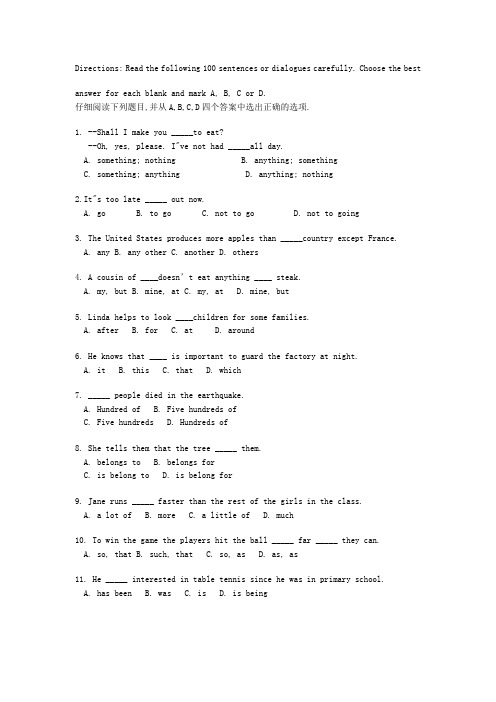
Directions: Read the following 100 sentences or dialogues carefully. Choose the bestanswer for each blank and mark A, B, C or D.仔细阅读下列题目,并从A,B,C,D四个答案中选出正确的选项.1. --Shall I make you _____to eat?--Oh, yes, please. I"ve not had _____all day.A. something; nothingB. anything; somethingC. something; anythingD. anything; nothing2.It"s too late _____ out now.A. goB. to goC. not to goD. not to going3. The United States produces more apples than _____country except France.A. anyB. any otherC. anotherD. others4. A cousin of ____doesn’t eat anything ____ steak.A. my, butB. mine, atC. my, atD. mine, but5. Linda helps to look ____children for some families.A. afterB. forC. atD. around6. He knows that ____ is important to guard the factory at night.A. itB. thisC. thatD. which7. _____ people died in the earthquake.A. Hundred ofB. Five hundreds ofC. Five hundredsD. Hundreds of8. She tells them that the tree _____ them.A. belongs toB. belongs forC. is belong toD. is belong for9. Jane runs _____ faster than the rest of the girls in the class.A. a lot ofB. moreC. a little ofD. much10. To win the game the players hit the ball _____ far _____ they can.A. so, thatB. such, thatC. so, asD. as, as11. He _____ interested in table tennis since he was in primary school.A. has beenB. wasC. isD. is being12. _____ patience and _____words of advice help more than medicine, sometimes.A. little, fewB. a little, a fewC. few, littleD. a few, a little13. When did you _____ your hair _____?A. have, cutB. have, cuttedC. cutted,/D. cutting,/14. Please tell _____ what you want.A. usB. weC. ourD. ours15. He _____ to work at 8 every morning.A. goB. wentC. is goingD. goes16. Tom’s father has a _____ brother.A. 52-years-oldB. 52-year-oldC. 52-years oldD. 52 old17. ---Do they like English?--- No, they _____.A. isB. isn’tC. don’tD. doesn’t18. _____ two different meetings in this building tomorrow morning.A. There wasB. There isC. There areD. There will be19. Where _____ yesterday?A. did he studiesB. did he studiedC. did he studiesD. did he study20. Look at the dark clouds. It _____ rain.A. willB. is going toC. wouldD. is21. What _____ now ?A. are you doingB. do you leaveC. do you doD. you do22. Look! They _____ football.A. are playingB. playC. playingD. played23. He _____.A. always cryB. has always criedC. is always cryingD. will always cry24. The best way _____study English is to practice more.A. forB. toC. withD. of25. Our room is big, but____ is bigger than____.A. their; ourB. their; oursC. theirs; oursD. theirs; our26. ____ is the best season of the year?A. WhenB. WhatC. WhichD. What time27. You are twelve now. ____ must look after____.A. You; yourselfB. Your; yourselfC. You; yourD. You ; yourselves28. Could you do ____for me, please?A. everythingB. nothingC. somethingD. anything29. There are forty-four students in Class One. Nineteen of them are boys, ___are girls.A. the otherB. the othersC. othersD. some others30. Hurry up! There is____ time left.A. fewB. a fewC. littleD. a little31. --How many panda did you see in the zoo?--______.A. NeverB. NoneC. No oneD. Nothing32. The students often help_____.A. one the otherB. each the otherC. one anotherD. two another33. She will go if it _____ tomorrow.A. isn"t rainB. don"t rainC. doesn"t rainD. didn"t rain34. --____ he ____ to work on foot?--Yes, he____.A. Do; go; doB. Does; go; doesC. Is ; going; doesD. Does; go; is35. ____ you ____ your homework now?A. Do; doingB. Are; doingC. Were; doingD. Does; do36. They ____ uncle Wang this evening.A. is meetingB. meetsC. meetD. are going to meet37. They are late. The film __ for five minutes.A. has begunB. has startedC. has been onD. began38. -Is this the last exam for this term?-Yes, but there_____ another test three months from now.A. isB. wasC. will beD. has been39. This English song_____ by the girls after class.A. often singsB. often sangC. is often sangD. is often sung40. Please _____ before you cross the road.A. look upB. look yourselfC. look aroundD. look again41. A strong wind will arrive in Harbin. It will ____ much rain.A. bringB. takeC. carryD. get42. I can ____ you my dictionary, but you can _____ it for only a week.A. borrow; borrowB. lend; borrowC. borrow; keep .D. lend; keep43. Could you ____ me how to ____ this word in French?A. tell; speakB. speak; talkC. talk; sayD. tell; say44. My parents ____ about 1, 000 yuan for my school education each year.A. spendB. takeC. costD. pay45. I have read____ you lent me.A.all of booksB. the all booksC.all the booksD. whole the books46. There was ____food left, though we all got hungry.A. littleB. a littleC. a fewD. few47. On the table there are five____.A. tomatosB. piece of tomatoesC. tomatoesD. tomato48.What____ lovely weather it is!A. /B. theC. anD. a49. They asked me ____ with them last Sunday.A. to go shoppingB. went shoppingC. going shoppingD. go shopping50. My mother always stopped me from ____ in the evening.A. watch TVB. to watch TVC. watches TVD. watching TV51.My father likes to ____ the newspapers after supper.A. readB. lookC. seeD. watch52.Drink some milk. It’s good____ your health.A. ofB. forC. atD. to53.H e doesn’t want____ to you.A. speakB.speaksC.to speakD. speaking54.Miss. Gao paid $30____the coat.A. forB.toC. inD. at55.They have a dog. We____have a dog.A. tooB.alsoC. soD. however56.The Whites ____ a garden with beautiful roses.A. to haveB. hasC. haveD. having57.They have two houses,____ they don’t have cars.A. soB. tooC. butD. or58.The climate in Beijing and Shanghai is the same.The climate changes____ between the two cities.A. a littleB. a little ofC. very littleD. small59.Spring temperatures are different____autumn temperatures.A. toB. fromC. ofD. in60.The cake smells and tastes very____ .A. wellB. nicelyC. goodD. better61.Please look____ the pictures on the wall.A. atB. toC. onD. /62.What____ he usually _____ every day?A. does, doB.do, doC. does, doesD. do, does63.The green apples are ____ beautiful than the red ones.A. mostB. the mostC. moreD. the more64.Bill likes to ____ apples _____ work in the morning.A. take, toB.takes, toC.give, toD. gives, to65.The US is proud ____ its apples.A. atB. forC. ofD. to66.The book on the table is ____ .A. myB. IC. mineD. me67.We want to read books____ music.A. ofB. atC. aboutD. off68.____ is something for you outside the door.A. TheirB. ThereC. TheseD. Those69.They often do their homework at home,____they?A. aren’tB. areC. doD. don’t70.There is no pills ____ make you happy.A. toB. forC. ofD. about71. ____to school by bike is like _____ to school by bus.A. Go, goB. Going, goC. Go, goingD. Going, going72.The best way____ study English is _____ read more.A. to, toB. for, forC. to, forD. for, to73.He looked at Tom ____ amazement.A. atB. inC. ofD. about74.They haven’t____ to each other for years.A. speakB. spokeC. spokenD. speaking75.Do you believe the green garden ____ roses is _____.A. with, hersB.with, herC.have, hersD. have, her76.They came back early in order_____ the movie.A. to watchB.to seeC. to lookD. see77.When will you have your clothes _____ ?A. washB. washingC. washedD. to wash78.They have a large ____ of money.A. manyB. muchC. sumD. some79.Are you willing ____ join us?A. toB. forC. ofD. in80. Please _____ me a chair from the dean’s office.A. takeB. bringC. fetchD. carry81.When will you _____ back?A. isB. areC. beD. been82.They have been working ____ a teacher for 10 years.A. atB. inC. asD. of83.Are you two able to play ____?A. pianoB. a pianoC. the pianoD. pianoes84.They were interested ____ English books.A. atB. onC. inD. for85.My ____ car is made in Japan.A. fatherB. fathersC. father’sD. fathers’86.Would you like to live in the city or in ____ country?A. aB. theC. anD. /87.He runs as____ as Tom in our school.A. quickerB. quicklierC. fasterD. fast88.I did not want to buy the houseNeither ____ I.A. doB. didC. wasD. were89.I cannot convince them ____ the fact.A. thatB. onC. atD. of90.What are you going to do _ the book?A. withB. atC. onD. of91.I don’t feel like _____.A. going outB. goes outC. to go outD. go out92.“I worked as a waiter,” said her fath er.“I had to get used _____ English fast in order to survive.”A. to speakB. speakingC. to speakingD. speak93.If the students could not answer their questions, she taught them _____.A. what to say it.B. what to sayC. how to sayD. how they say94.Moraji enjoyed riding in his friend’s new car, _____ was made in Sweden.A. itB. the carC. whenD. which95.“Here, See what’s on,” suggested Carolyn, _____ her the paper.A.to throw B.Throw C.threw D.throwing96.Pete explained that most of the people _____ French.A.tell B.say C.remark D.spe ak97.It ____ a long time to visit the beautiful but far-off island on the west coast. A.spends B.pay C.takes D.taken98.The room was clean and bright and a white vast ____ beside the window.A.stand B.stood C.stands D.standi ng99.Then Tony went downstairs ____ knocked at the door of Mrs. Zimmerman’s office.A.however B.but C.and D.while100.There was plenty of time for those ____ like to swim to go into the water. A.who B.they C.whom D.them答案:1-5: C B B D A 6-10: A D A D D11-15:A B A A D 16-20:B C D D B21-25:A A C B C 26-30:C A C B C31-35:B C C B B 36-40:D C C D C41-45:A D D D C 46-50:A C A A D51-55:A B C A B 56-60:C C C B C61-65:A A C A C 66-70:C C B D A71-75:D A B C A 76-80:A C C A C81-85:C C C C C 86-90:B D B D D91-95:A C B D D 96-100:D C B C A。
雅思英语口试题及答案
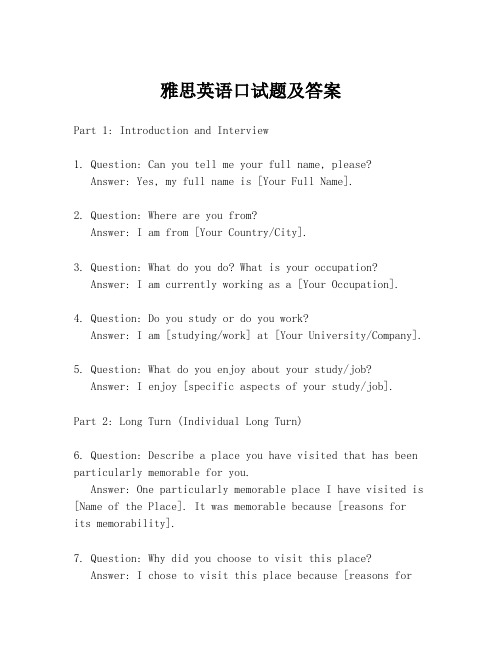
雅思英语口试题及答案Part 1: Introduction and Interview1. Question: Can you tell me your full name, please?Answer: Yes, my full name is [Your Full Name].2. Question: Where are you from?Answer: I am from [Your Country/City].3. Question: What do you do? What is your occupation?Answer: I am currently working as a [Your Occupation].4. Question: Do you study or do you work?Answer: I am [studying/work] at [Your University/Company].5. Question: What do you enjoy about your study/job?Answer: I enjoy [specific aspects of your study/job].Part 2: Long Turn (Individual Long Turn)6. Question: Describe a place you have visited that has been particularly memorable for you.Answer: One particularly memorable place I have visited is [Name of the Place]. It was memorable because [reasons forits memorability].7. Question: Why did you choose to visit this place?Answer: I chose to visit this place because [reasons forchoosing this place].8. Question: What did you do there?Answer: While there, I [describe activities you did].9. Question: How did you feel about the experience?Answer: The experience made me feel [describe your emotions].Part 3: Discussion Topics10. Question: Do you think it's important for people to travel?Answer: Yes, I believe it is important for people to travel because [reasons supporting travel].11. Question: What are the benefits of traveling?Answer: Traveling has several benefits, such as [list benefits].12. Question: Do you think technology has changed the way people travel?Answer: Yes, technology has significantly changed the way people travel by [explain how technology has influenced travel].13. Question: What are some of the challenges people face when they travel?Answer: Some challenges people face when they travel include [list challenges].14. Question: How can people overcome these challenges?Answer: People can overcome these challenges by [suggestions for overcoming challenges].Note: The above answers are placeholders and should be personalized to reflect the candidate's own experiences and opinions.。
雅思英语学术听力与口语考试 选择题 62题
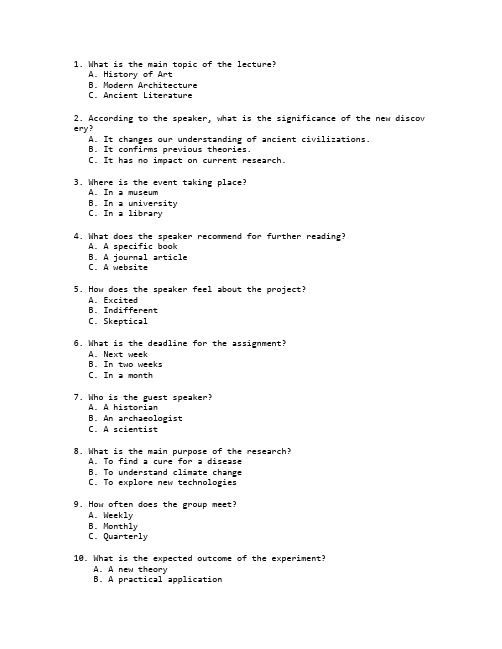
1. What is the main topic of the lecture?A. History of ArtB. Modern ArchitectureC. Ancient Literature2. According to the speaker, what is the significance of the new discov ery?A. It changes our understanding of ancient civilizations.B. It confirms previous theories.C. It has no impact on current research.3. Where is the event taking place?A. In a museumB. In a universityC. In a library4. What does the speaker recommend for further reading?A. A specific bookB. A journal articleC. A website5. How does the speaker feel about the project?A. ExcitedB. IndifferentC. Skeptical6. What is the deadline for the assignment?A. Next weekB. In two weeksC. In a month7. Who is the guest speaker?A. A historianB. An archaeologistC. A scientist8. What is the main purpose of the research?A. To find a cure for a diseaseB. To understand climate changeC. To explore new technologies9. How often does the group meet?A. WeeklyB. MonthlyC. Quarterly10. What is the expected outcome of the experiment?A. A new theoryB. A practical applicationC. A detailed report第11-20题:选择正确的答案11. What is the speaker's main argument?A. Technology is harmful.B. Technology is beneficial.C. Technology has no impact.12. How does the speaker suggest improving the situation?A. By reducing usageB. By increasing awarenessC. By ignoring the issue13. What is the main challenge discussed?A. Financial constraintsB. Lack of resourcesC. Political interference14. What is the speaker's opinion on the new policy?A. SupportiveB. CriticalC. Neutral15. What is the main focus of the discussion?A. Environmental issuesB. Social issuesC. Economic issues16. What is the main reason for the delay?A. Technical problemsB. Administrative issuesC. Weather conditions17. What is the speaker's role in the project?A. LeaderB. AssistantC. Observer18. What is the main benefit of the new system?A. EfficiencyB. Cost reductionC. User-friendliness19. What is the main concern expressed by the speaker?A. SafetyB. PrivacyC. Accessibility20. What is the main goal of the initiative?A. To raise fundsB. To increase participationC. To improve services第21-30题:选择正确的答案21. What is the main theme of the documentary?A. Wildlife conservationB. Human rightsC. Cultural heritage22. What is the speaker's main point?A. To informB. To persuadeC. To entertain23. What is the main source of conflict?A. Personal differencesB. Ideological differencesC. Resource scarcity24. What is the speaker's main recommendation?A. To take immediate actionB. To wait and seeC. To ignore the problem25. What is the main obstacle discussed?A. Lack of fundingB. Lack of supportC. Lack of interest26. What is the speaker's main achievement?A. Winning an awardB. Completing a projectC. Publishing a book27. What is the main impact of the change?A. PositiveB. NegativeC. Neutral28. What is the speaker's main concern?A. QualityB. QuantityC. Timeliness29. What is the main focus of the research?A. Historical eventsB. Scientific phenomenaC. Social trends30. What is the main reason for the success?A. Hard workB. LuckC. Support from others口语部分第31-40题:选择正确的答案31. What is your favorite book and why?A. Fiction because it's engaging.B. Non-fiction because it's informative.C. Poetry because it's inspiring.32. How do you manage stress?A. ExerciseB. MeditationC. Hobbies33. What is your opinion on remote work?A. PreferableB. Not suitableC. Depends on the situation34. How do you stay motivated?A. Setting goalsB. Rewarding myselfC. Seeking support35. What is your favorite holiday and why?A. Christmas for the family time.B. Summer vacation for the travel.C. New Year's Eve for the celebrations.36. How do you balance work and personal life?A. Prioritizing tasksB. Setting boundariesC. Delegating responsibilities37. What is your opinion on technology in education?A. Very beneficialB. OverratedC. Needs moderation38. How do you handle conflicts?A. Communicating openlyB. Avoiding confrontationC. Seeking mediation39. What is your favorite way to relax?A. ReadingB. Watching moviesC. Spending time outdoors40. How do you plan for the future?A. Setting long-term goalsB. Living in the momentC. Preparing for uncertainties第41-50题:选择正确的答案41. What is your opinion on climate change?A. A serious issueB. ExaggeratedC. Not convinced42. How do you contribute to environmental conservation?A. RecyclingB. Reducing consumptionC. Supporting green initiatives43. What is your favorite type of music and why?A. Classical for its complexity.B. Pop for its catchiness.C. Jazz for its improvisation.44. How do you handle criticism?A. Taking it constructivelyB. Ignoring itC. Getting defensive45. What is your opinion on social media?A. A great tool for connection.B. A distraction.C. A necessary evil.46. How do you stay informed about current events?A. Reading news articlesB. Watching news channelsC. Listening to podcasts47. What is your favorite way to exercise?A. RunningB. YogaC. Team sports48. How do you handle pressure?A. Staying organizedB. Seeking helpC. Taking breaks49. What is your opinion on artificial intelligence?A. Exciting developmentB. Potential threatC. Not interested50. How do you celebrate success?A. With a partyB. With a rewardC. By setting new goals第51-62题:选择正确的答案51. What is your opinion on international travel?A. EnrichingB. OverratedC. Not feasible52. How do you handle cultural differences?A. With respectB. By ignoring themC. With discomfort53. What is your favorite cuisine and why?A. Italian for its variety.B. Japanese for its freshness.C. Indian for its spices.54. How do you handle disappointment?A. By learning from itB. By moving on quicklyC. By seeking support55. What is your opinion on lifelong learning?A. EssentialB. OverratedC. Not necessary56. How do you handle change?A. Embrace itB. Resist itC. Adapt gradually57. What is your favorite season and why?A. Spring for the renewal.B. Summer for the warmth.C. Autumn for the colors.58. How do you handle difficult decisions?A. By weighing pros and consB. By seeking adviceC. By trusting my instincts59. What is your opinion on volunteer work?A. Very rewardingB. Time-consumingC. Not for me60. How do you handle success?A. With humilityB. With prideC. With indifference61. What is your favorite hobby and why?A. Painting for creativity.B. Cooking for relaxation.C. Gardening for connection with nature.62. How do you handle failure?A. By learning from itB. By ignoring itC. By seeking comfort答案1. B2. A3. A4. B5. A6. B7. B8. A9. A10. B11. B12. B13. A14. A15. B16. A17. A18. A19. B20. C21. A22. B23. B24. A25. A26. B27. A28. A29. B30. A31. A32. B33. A34. A35. B36. B37. A38. A39. C40. A41. A42. B43. C44. A45. A46. B47. A48. C49. A50. B51. A52. A53. C54. A55. A56. A57. C58. A59. A60. A61. A62. A。
环球雅思学校英语水平测试题
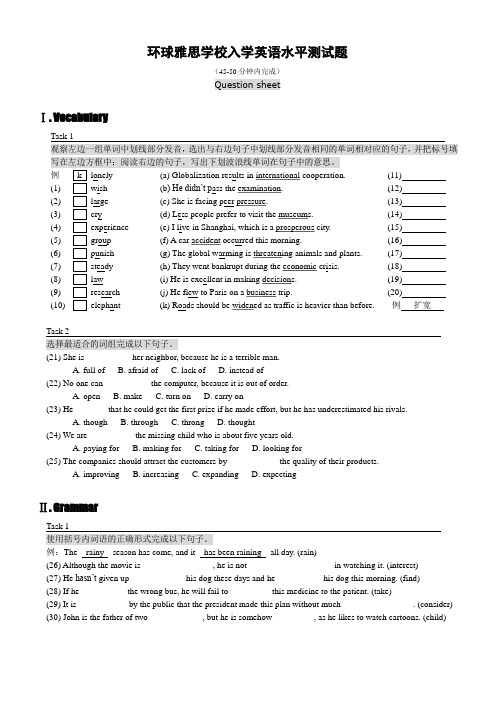
环球雅思学校入学英语水平测试题(45-50分钟内完成)Question sheetⅠ. Vocabulary(3) cry (d) Less people prefer to visit the museums. (14)(4) experience (e) I live in Shanghai, which is a prosperous city. (15)(5) group (f) A car accident occurred this morning. (16)(6) punish (g) The global warming is threatening animals and plants. (17)(7) steady (h) They went bankrupt during the economic crisis. (18)(8) law (i) He is excellent in making decisions. (19)(9) research (j) He flew to Paris on a business trip. (20)(10) elephant (k) Roads should be widened as traffic is heavier than before. 例扩宽(21) She is __________ her neighbor, because he is a terrible man.A. full ofB. afraid ofC. lack ofD. instead of(22) No one can __________ the computer, because it is out of order.A. openB. makeC. turn onD. carry on(23) He _______ that he could get the first prize if he made effort, but he has underestimated his rivals.A. thoughB. throughC. throngD. thought(24) We are __________ the missing child who is about five years old.A. paying forB. making forC. taking forD. looking for(25) The companies should attract the customers by ___________ the quality of their products.A. improvingB. increasingC. expandingD. expectingⅡ. Grammar例:The rainy season has come, and it has been raining all day. (rain)(26) Although the movie is ________________, he is not ___________________ in watching it. (interest)(27) He hasn‟t given up ____________ his dog these days and he __________ his dog this morning. (find)(28) If he __________ the wrong bus, he will fail to _________ this medicine to the patient. (take)(29) It is ___________ by the public that the president made this plan without much ________________. (consider)(30) John is the father of two ____________, but he is somehow _________, as he likes to watch cartoons. (child)(31) He ordered that the books ____________ at once.A. would be printedB. would printC. be printedD. print(32) Nobody _________ how to run this machine.A. knowB. have knownC. knowsD. is knowing(33) He is explaining his plan _________ half of the staff will be moving out of the city.A. whichB. whoC. thatD. where(34) Peter ________ well last night because of the noise.A. hadn‟t sleptB. didn‟t sleptC. hadn‟t sleepD. didn‟t sleep(35) Before I _______ him, he _________ his apartment.A. called…had leftB. called…leftC. had called…leftD. had called…had left(36) The Greens _________ China for five years.A. has been inB. have been inC. went toD. has gone to(37) ___________ about the story, Tom retold it in his own words.A. HeardB. HearingC. Having heardD. Having hearing(38) The boss made me _______ all the tiring jobs and I quit my job.A. doB. doneC. doingD. to do(39) Each of the students __________ a new bag by the charity group.A. is givenB. is givingC. are givenD. are giving(40) I have no idea ___________.A. what are you doingB. what you are doingC. what he doD. what is heⅢ. ReadingTask 1The Man behind Blue JeansLevi Strauss was born in 1829 in Bavaria, Germany. He was the fifth of six children. His father sold dry goods from door to door. (Dry goods include many different things: fabric, thread, scissors, combs, buttons, yarn, etc.)In 1845, his father died. All six children decided to go to the United States. Two of Strauss‟ bothers started a dry goods company in New Y ork City. Strauss‟ sister Fanny and her husband started a similar business in San Francisco. Strauss decided to go to the southeastern part of the United States. For eight years, he walked along the country roads selling dry goods from door to door -- just like his father in Bavaria.In 1853, Strauss decided to move to San Francisco. (At that time, thousands of people traveled to California to look for gold.) On the way to California, Strauss sold almost all of his dry goods. He had only one thing left -- some canvas.In California, Strauss tried to sell the canvas to the gold miners. He said they could make tents from the canvas. But they weren‟t interested in canvas for tents. Strauss didn‟t know what to do with the canvas. Then, he had an idea. Strauss could see that the miners needed new pants. There were holes in their pants because the fabric wasn‟t strong. He decided to make the canvas into pants. They called them “Levi‟s”. Later, Strauss stopped using canvas and used a different fabric. It was a heavy cotton fabric -- the same kind people wear today.Levi Strauss died in 1902. He never married and left his money to his nephews. He left the world much more -- the jeans that so many people wear.(41) ________ isn…t a kind of dry goods. A. Thread B. Gold C. Comb D. Y arn(42) What is canvas?A. Tent.B. Pants.C. A very strong fabric.D. A thing which is used to make all kinds of trousers.(43) Why did the miners call the pants “Levi‟s”?A. Because the pants belonged to Levi Strauss‟ father.B. In memory of Levi Strauss‟ father.C. It…s the name of Levi‟ Strau ss‟ nephew.D. Because the pants are Levi‟s invention.(44) Choose the right order of these happenings.a. Strauss decided to move to San Francisco.b. Strauss‟ father died.c. Two of Strauss‟ brothers started a dry goods company in New Y ork City.d. Strauss invented the jeans.A. a-b-c-dB. a-d-b-cC. b-a-c-dD. b-c-a-d(45) Which of the following is NOT true about Levi Strauss?A. He was born in Germany.B. His parents had six children.C. He had five children.D. He died in 1902.Task 2A wareness Weeks have become a regular part of Britain‟s cultural landscape over the past few years. They started back in 1957, when one charity, Christian Aid, decided to make all its money-raising efforts on one time of year. It was thought that by doing this they would get more publicity for their cause.They were right, and soon other charities and campaign groups followed them. These days, most donations to charity are not collected on the streets. So instead of just asking for money, charities prefer to spend their time “raising awareness” -- spreading knowledge of the work they do or the cause they support. They also compete with businesses and trade groups who use awareness weeks as marketing campaigns for their products.There are now 500 awareness weeks held every year in the UK. No week goes by without one group or another trying to make the British public aware of something, with most held in May or October.The danger with all these awareness weeks is that people start to become cynical. Take National Smile Week, it seems like a great idea. Let‟s all make each other‟s life a little bit happier with a friendly smile. But really it‟s just a group of den tists and cosmetics companies trying to sell us toothpaste. It‟s enough to make you want to start National Forget About It Week.“People feel that many awareness campaigns are just marketing exercises,” says Ms Ormiston, who edits the A wareness Campaign Register, a news letter which encourages people who run A wareness Weeks to become more aware of each other. “But 90 per cent of campaigns are run by traditional charities or not for groups to make money.”“There‟s still no official group for awareness campaigns,” says Ms Ormiston. “People can do what they like, whatever the size of their budgets or their public relations machines allows.”This situation has led to calls for laws to stop real charities having their efforts overshadowed by marketing campaigns. This could be done by making the two groups hold their weeks at different times or stopping businesses running imitation charity campaigns.But there is another way. Maybe it‟s time for National Weak A wareness Week, especially for people whose awareness of A wareness Weeks is weak.(46) What‟s the main purpose of awareness weeks run by charities in Britain?A.To raise money for charities. B.To spread knowledge of charities.C.To take up marketing campaigns. D.To advertise their goods for sale.(47) Why do people start to become cynical about awareness weeks?A.Too many awareness weeks make people feel bored.B.People feel many awareness weeks are just for marketing exercises.C.People have a weak awareness of awareness weeks.D.A wareness weeks are held too often and too much money is raised.(48) What does Ms Ormiston think about awareness weeks?A.Most of the awareness weeks should not be for making money.B.Official groups should take the place of charities in awareness campaigns.C.People can do what they like in awareness weeks.D.People can get larger budgets through awareness campaigns.(49) Which of the following is the right measure to be taken to solve the problems in awareness campaigns?A.Laws should stop awareness weeks run by real charities.B.There should be large public relations departments in awareness campaigns.C.Business and awareness campaigns should not be held at the same place.D.Marketing campaigns should not be in the name of charity ones.(50) What‟s the writer‟s view on A wareness Weeks?A.National Forget About It Week should be held to stop awareness weeks.B.National Smile Week is a great idea to improve people‟s life.C.National Weak A wareness Week can help people better understand awareness weeks.D.A wareness Weeks should be stopped because of marketing campaigns.Ⅳ. Writing翻译以下句子。
大学英语雅思试题及答案
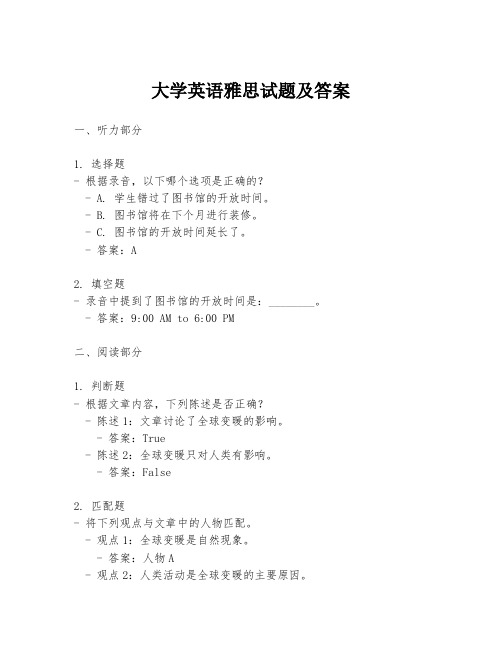
大学英语雅思试题及答案一、听力部分1. 选择题- 根据录音,以下哪个选项是正确的?- A. 学生错过了图书馆的开放时间。
- B. 图书馆将在下个月进行装修。
- C. 图书馆的开放时间延长了。
- 答案:A2. 填空题- 录音中提到了图书馆的开放时间是:________。
- 答案:9:00 AM to 6:00 PM二、阅读部分1. 判断题- 根据文章内容,下列陈述是否正确?- 陈述1:文章讨论了全球变暖的影响。
- 答案:True- 陈述2:全球变暖只对人类有影响。
- 答案:False2. 匹配题- 将下列观点与文章中的人物匹配。
- 观点1:全球变暖是自然现象。
- 答案:人物A- 观点2:人类活动是全球变暖的主要原因。
- 答案:人物B三、写作部分1. 图表作文- 根据所给图表,描述以下内容:- 描述图表中展示的趋势。
- 解释可能的原因。
- 提出个人观点。
- 答案示例:- 近年来,全球气温持续上升,这从图表中的数据可以明显看出。
- 可能的原因包括工业排放增加和森林覆盖率的减少。
- 我认为,为了减缓全球变暖,我们应当采取更多环保措施。
四、口语部分1. 个人陈述- 描述你最喜欢的季节,并解释原因。
- 答案示例:- 我最喜欢的季节是秋天。
秋天天气凉爽,树叶变色,给人一种宁静的感觉。
2. 讨论题- 讨论全球变暖对环境的影响,并提出解决方案。
- 答案示例:- 全球变暖导致极地冰川融化,海平面上升。
为了解决这个问题,我们可以减少碳排放,使用可再生能源。
注意:以上答案仅为示例,实际考试中应根据具体题目内容作答。
雅思英语试题及答案
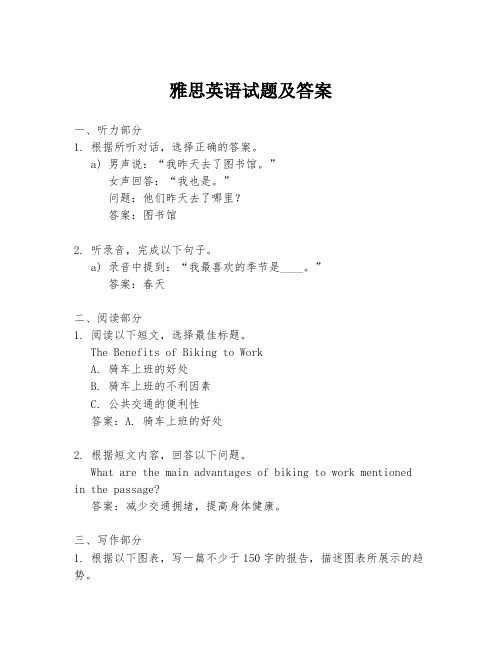
雅思英语试题及答案一、听力部分1. 根据所听对话,选择正确的答案。
a) 男声说:“我昨天去了图书馆。
”女声回答:“我也是。
”问题:他们昨天去了哪里?答案:图书馆2. 听录音,完成以下句子。
a) 录音中提到:“我最喜欢的季节是____。
”答案:春天二、阅读部分1. 阅读以下短文,选择最佳标题。
The Benefits of Biking to WorkA. 骑车上班的好处B. 骑车上班的不利因素C. 公共交通的便利性答案:A. 骑车上班的好处2. 根据短文内容,回答以下问题。
What are the main advantages of biking to work mentioned in the passage?答案:减少交通拥堵,提高身体健康。
三、写作部分1. 根据以下图表,写一篇不少于150字的报告,描述图表所展示的趋势。
图表:某城市过去十年的人口增长趋势答案示例:在过去十年中,该城市的人口经历了显著的增长。
从图表中可以看出,2003年的人口数量为50万,而到了2013年,人口数量增加到了80万。
这一增长趋势反映了城市化进程的加快以及人们对城市生活的偏好。
此外,经济增长和就业机会的增加也可能是人口增长的原因之一。
四、口语部分1. 描述你最喜欢的季节,并解释原因。
答案示例:我最喜欢的季节是秋天。
秋天的天气凉爽宜人,不像夏天那样炎热,也不像冬天那样寒冷。
此外,秋天是收获的季节,我喜欢看到金黄色的麦田和成熟的果实。
秋天的景色也很美,树叶变黄,落在地上,给人一种宁静的感觉。
2. 讨论现代科技对人们日常生活的影响。
答案示例:现代科技极大地改变了我们的日常生活。
首先,智能手机和互联网让我们能够随时随地获取信息和与他人沟通。
其次,自动化和人工智能提高了工作效率,减少了人力需求。
然而,科技的发展也带来了一些问题,比如隐私泄露和网络安全问题。
总的来说,科技的利大于弊,我们应该合理利用科技,同时注意保护个人信息安全。
雅思英语语法练习题

雅思英语语法练习题一、选择题(每题2分,共20分)1. The concert was so exciting that I couldn’t help _______.A. to singB. singingC. singD. sang2. She is _______ to be the best student in her class.A. likelyB. probableC. possiblyD. probably3. The teacher asked the students _______ the homework on time.A. to hand inB. hand inC. handing inD. handed in4. He _______ the book for two weeks.A. has borrowedB. has keptC. has lentD. has had5. I _______ my keys in the office. I must go back and getthem.A. forgotB. leftC. lostD. missed6. _______ the weather is fine, we will go for a picnic.A. ProvidedB. ProvidingC. To provideD. Having provided7. I _______ you about my decision if I had known you were coming.A. would tellB. would have toldC. had toldD. have told8. The company has _______ a new policy regarding employee benefits.A. implementedB. implementedlyC. implementD. implementating9. _______ the problem, the committee decided to hold an emergency meeting.A. FacingB. Faced withC. To faceD. Having faced10. The children were _______ when they heard the news.A. excitedB. excitingC. more excitedD. the most excited二、填空题(每题2分,共20分)Fill in the blanks with the correct form of the word given in brackets.11. The _______ (discover) of penicillin by Alexander Fleming was a major breakthrough in medicine.12. She is very _______ (patient) about her work and always takes her time to do things well.13. The _______ (amaze) expression on his face showed that he had never seen anything like it before.14. The _______ (arrive) of the guests was delayed due to the heavy rain.15. He has a _______ (natural) talent for music and can play any instrument he touches.16. The _______ (science) community is divided over the issue of climate change.17. The _______ (excite) news of the team's victory quickly spread throughout the town.18. The _______ (honest) of the statement is questionable, as there are some inconsistencies.19. The _______ (brave) of the soldiers was commendable in the face of such adversity.20. The _______ (origin) of the language is still a subject of debate among linguists.三、改错题(每题2分,共20分)For the following sentences, identify and correct the grammatical errors.21. If I would have known about the meeting, I would have attended it.22. The children are playing in the garden and they looks very happy.23. She has been studying English for three years and she is very proficient now.24. There is a lot of informations in this book that can help you with your research.25. I used to play football but I don’t anymore because I have been busy.26. The company was founded in 1990 and it has grown significantly ever since.27. He is one of the most talented musician that I have ever met.28. She is too tired to go out tonight, so she will stay at home instead.29. The weather forecast predicts heavy rain, so we should bring an umbrellas.30. I have been living in this city for five years and I love it very much.四、翻译题(每题5分,共20分)Translate the following sentences into English.31. 这个项目的成功在很大程度上取决于团队的合作。
雅思英语试题及答案解析
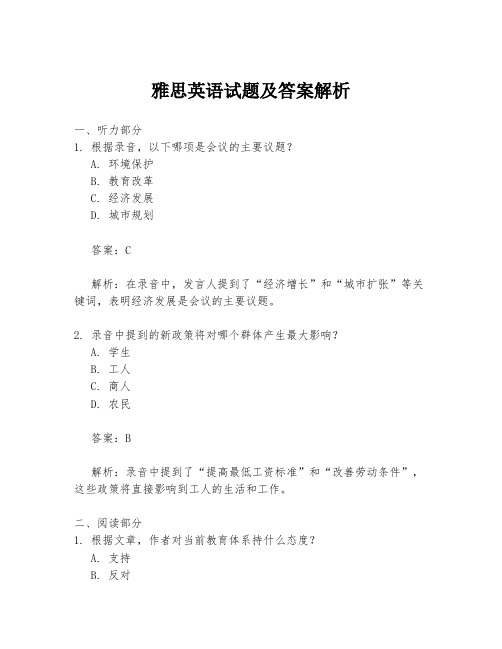
雅思英语试题及答案解析一、听力部分1. 根据录音,以下哪项是会议的主要议题?A. 环境保护B. 教育改革C. 经济发展D. 城市规划答案:C解析:在录音中,发言人提到了“经济增长”和“城市扩张”等关键词,表明经济发展是会议的主要议题。
2. 录音中提到的新政策将对哪个群体产生最大影响?A. 学生B. 工人C. 商人D. 农民答案:B解析:录音中提到了“提高最低工资标准”和“改善劳动条件”,这些政策将直接影响到工人的生活和工作。
二、阅读部分1. 根据文章,作者对当前教育体系持什么态度?A. 支持B. 反对C. 中立D. 未明确表态答案:B解析:文章中作者多次使用“outdated”(过时的)和“ineffective”(无效的)等词汇来描述当前的教育体系,表明作者持有反对的态度。
2. 文章中提到的“21世纪技能”包括哪些方面?A. 批判性思维B. 创造力C. 团队合作D. 所有上述答案:D解析:文章明确提到了“批判性思维”、“创造力”和“团队合作”是21世纪技能的重要组成部分。
三、写作部分1. 题目:Some people believe that the government shouldprovide financial support to artists and musicians, while others argue that artists should support themselves. Discuss both views and give your opinion.答案:略解析:在写作部分,考生需要首先概述两种观点,然后给出自己的见解。
注意使用多样的语言表达和连贯的逻辑结构。
四、口语部分1. 问题:Describe a memorable trip you have taken.答案:略解析:在口语部分,考生需要描述一次难忘的旅行经历,包括旅行的地点、时间、活动以及这次旅行为什么难忘。
英语雅思试题及答案
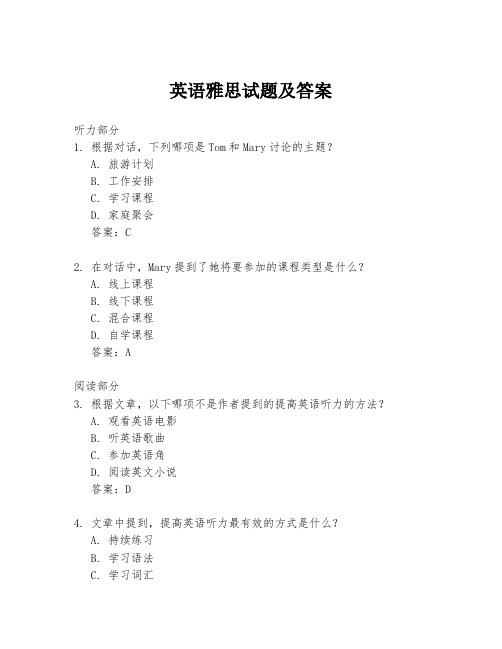
英语雅思试题及答案听力部分1. 根据对话,下列哪项是Tom和Mary讨论的主题?A. 旅游计划B. 工作安排C. 学习课程D. 家庭聚会答案:C2. 在对话中,Mary提到了她将要参加的课程类型是什么?A. 线上课程B. 线下课程C. 混合课程D. 自学课程答案:A阅读部分3. 根据文章,以下哪项不是作者提到的提高英语听力的方法?A. 观看英语电影B. 听英语歌曲C. 参加英语角D. 阅读英文小说答案:D4. 文章中提到,提高英语听力最有效的方式是什么?A. 持续练习B. 学习语法C. 学习词汇D. 参加英语考试答案:A写作部分5. 以下哪个论点不是文章中提到的支持学习英语的理由?A. 提高职业机会B. 促进文化交流C. 增加旅游便利D. 学习计算机编程答案:D6. 文章中提到,学习英语可以带来哪些好处?A. 职业发展B. 文化理解C. 国际交流D. 所有以上选项答案:D口语部分7. 在口语考试中,考生需要描述一个他们曾经参观过的地方。
以下哪个描述是不合适的?A. 描述地点的地理位置B. 描述地点的建筑风格C. 描述地点的自然风光D. 描述地点的购物体验答案:D8. 在口语考试中,考生需要谈论一个他们感兴趣的话题。
以下哪个话题是不合适的?A. 个人爱好B. 科技发展趋势C. 环境保护问题D. 个人隐私问题答案:D注意:以上试题及答案仅为示例,实际雅思考试内容和形式可能有所不同。
- 1、下载文档前请自行甄别文档内容的完整性,平台不提供额外的编辑、内容补充、找答案等附加服务。
- 2、"仅部分预览"的文档,不可在线预览部分如存在完整性等问题,可反馈申请退款(可完整预览的文档不适用该条件!)。
- 3、如文档侵犯您的权益,请联系客服反馈,我们会尽快为您处理(人工客服工作时间:9:00-18:30)。
Directions: Read the following 100 sentences or dialogues carefully. Choose the bestanswer for each blank and mark A, B, C or D.仔细阅读下列题目,并从A,B,C,D四个答案中选出正确的选项.1. --Shall I make you _____to eat?--Oh, yes, please. I"ve not had _____all day.A. something; nothingB. anything; somethingC. something; anythingD. anything; nothing"s too late _____ out now.A. goB. to goC. not to goD. not to going3. The United States produces more apples than _____country except France.A. anyB. any otherC. anotherD. others4. A cousin of ____doesn’t eat anything ____ steak.A. my, butB. mine, atC. my, atD. mine, but5. Linda helps to look ____children for some families.A. afterB. forC. atD. around6. He knows that ____ is important to guard the factory at night.A. itB. thisC. thatD. which7. _____ people died in the earthquake.A. Hundred ofB. Five hundreds ofC. Five hundredsD. Hundreds of8. She tells them that the tree _____ them.A. belongs toB. belongs forC. is belong toD. is belong for9. Jane runs _____ faster than the rest of the girls in the class.A. a lot ofB. moreC. a little ofD. much10. To win the game the players hit the ball _____ far _____ they can.A. so, thatB. such, thatC. so, asD. as, as11. He _____ interested in table tennis since he was in primary school.A. has beenB. wasC. isD. is being12. _____ patience and _____words of advice help more than medicine, sometimes.A. little, fewB. a little, a fewC. few, littleD. a few, a little13. When did you _____ your hair _____?A. have, cutB. have, cuttedC. cutted,/D. cutting,/14. Please tell _____ what you want.A. usB. weC. ourD. ours15. He _____ to work at 8 every morning.A. goB. wentC. is goingD. goes16. Tom’s father has a _____ brother.A. 52-years-oldB. 52-year-oldC. 52-years oldD. 52 old17. ---Do they like English?--- No, they _____.A. isB. isn’tC. don’tD. doesn’t18. _____ two different meetings in this building tomorrow morning.A. There wasB. There isC. There areD. There will be19. Where _____ yesterday?A. did he studiesB. did he studiedC. did he studiesD. did he study20. Look at the dark clouds. It _____ rain.A. willB. is going toC. wouldD. is21. What _____ now ?A. are you doingB. do you leaveC. do you doD. you do22. Look! They _____ football.A. are playingB. playC. playingD. played23. He _____.A. always cryB. has always criedC. is always cryingD. will always cry24. The best way _____study English is to practice more.A. forB. toC. withD. of25. Our room is big, but____ is bigger than____.A. their; ourB. their; oursC. theirs; oursD. theirs; our26. ____ is the best season of the year?A. WhenB. WhatC. WhichD. What time27. You are twelve now. ____ must look after____.A. You; yourselfB. Your; yourselfC. You; yourD. You ; yourselves28. Could you do ____for me, please?A. everythingB. nothingC. somethingD. anything29. There are forty-four students in Class One. Nineteen of them are boys, ___are girls.A. the otherB. the othersC. othersD. some others30. Hurry up! There is____ time left.A. fewB. a fewC. littleD. a little31. --How many panda did you see in the zoo?--______.A. NeverB. NoneC. No oneD. Nothing32. The students often help_____.A. one the otherB. each the otherC. one anotherD. two another33. She will go if it _____ tomorrow.A. isn"t rainB. don"t rainC. doesn"t rainD. didn"t rain34. --____ he ____ to work on foot?--Yes, he____.A. Do; go; doB. Does; go; doesC. Is ; going; doesD. Does; go; is35. ____ you ____ your homework now?A. Do; doingB. Are; doingC. Were; doingD. Does; do36. They ____ uncle Wang this evening.A. is meetingB. meetsC. meetD. are going to meet37. They are late. The film __ for five minutes.A. has begunB. has startedC. has been onD. began38. -Is this the last exam for this term?-Yes, but there_____ another test three months from now.A. isB. wasC. will beD. has been39. This English song_____ by the girls after class.A. often singsB. often sangC. is often sangD. is often sung40. Please _____ before you cross the road.A. look upB. look yourselfC. look aroundD. look again41. A strong wind will arrive in Harbin. It will ____ much rain.A. bringB. takeC. carryD. get42. I can ____ you my dictionary, but you can _____ it for only a week.A. borrow; borrowB. lend; borrowC. borrow; keep .D. lend; keep43. Could you ____ me how to ____ this word in French?A. tell; speakB. speak; talkC. talk; sayD. tell; say44. My parents ____ about 1, 000 yuan for my school education each year.A. spendB. takeC. costD. pay45. I have read____ you lent me.of books B. the all booksthe books D. whole the books46. There was ____food left, though we all got hungry.A. littleB. a littleC. a fewD. few47. On the table there are five____.A. tomatosB. piece of tomatoesC. tomatoesD. tomatolovely weather it is!A. /B. theC. anD. a49. They asked me ____ with them last Sunday.A. to go shoppingB. went shoppingC. going shoppingD. go shopping50. My mother always stopped me from ____ in the evening.A. watch TVB. to watch TVC. watches TVD. watching TVfather likes to ____ the newspapers after supper.A. readB. lookC. seeD. watchsome milk. It’s good____ your health.A. ofB. forC. atD. todoesn’t want____ to you.A. speak speak D. speaking. Gao paid $30____the coat.A. for C. in D. athave a dog. We____have a dog.A. too C. so D. howeverWhites ____ a garden with beautiful roses.A. to haveB. hasC. haveD. havinghave two houses,____ they don’t have cars.A. soB. tooC. butD. orclimate in Beijing and Shanghai is the same.The climate changes____ between the two cities.A. a littleB. a little ofC. very littleD. smalltemperatures are different____autumn temperatures. A. to B. from C. of D. incake smells and tastes very____ .A. wellB. nicelyC. goodD. betterlook____ the pictures on the wall.A. atB. toC. onD. /he usually _____ every day?A. does, do , do C. does, does D. do, doesgreen apples are ____ beautiful than the red ones. A. most B. the most C. more D. the morelikes to ____ apples _____ work in the morning.A. take, to , to , to D. gives, toUS is proud ____ its apples.A. atB. forC. ofD. tobook on the table is ____ .A. myB. IC. mineD. mewant to read books____ music.A. ofB. atC. aboutD. offis something for you outside the door.A. TheirB. ThereC. TheseD. Thoseoften do their homework at home,____they?A. aren’tB. areC. doD. don’tis no pills ____ make you happy.A. toB. forC. ofD. about71. ____to school by bike is like _____ to school by bus.A. Go, goB. Going, goC. Go, goingD. Going, goingbest way____ study English is _____ read more.A. to, toB. for, forC. to, forD. for, tolooked at Tom ____ amazement.A. atB. inC. ofD. abouthaven’t____ to each other for years.A. speakB. spokeC. spokenD. speakingyou believe the green garden ____ roses is _____.A. with, hers , her , hers D. have, hercame back early in order_____ the movie.A. to watch see C. to look D. seewill you have your clothes _____ ?A. washB. washingC. washedD. to washhave a large ____ of money.A. manyB. muchC. sumD. someyou willing ____ join us?A. toB. forC. ofD. in80. Pleas e _____ me a chair from the dean’s office.A. takeB. bringC. fetchD. carrywill you _____ back?A. isB. areC. beD. beenhave been working ____ a teacher for 10 years.A. atB. inC. asD. ofyou two able to play ____?A. pianoB. a pianoC. the pianoD. pianoeswere interested ____ English books.A. atB. onC. inD. for____ car is made in Japan.A. fatherB. fathersC. father’sD. fathers’you like to live in the city or in ____ country?A. aB. theC. anD. /runs as____ as Tom in our school.A. quickerB. quicklierC. fasterD. fastdid not want to buy the houseNeither ____ I.A. doB. didC. wasD. werecannot convince them ____ the fact.A. thatB. onC. atD. ofare you going to do _ the book?A. withB. atC. onD. ofdon’t feel like _____.A. going outB. goes outC. to go outD. go out92.“I worked as a waiter,” said her father.“I had to get used _____ English fast in order to survive.”A. to speakB. speakingC. to speakingD. speakthe students could not answer their questions, she taught them _____.A. what to say it.B. what to sayC. how to sayD. how they sayenjoyed riding in his friend’s new car, _____ was made in Swed en.A. itB. the carC. whenD. which95.“Here, See what’s on,” suggested Carolyn, _____ her the paper.A.to throw B.Throw C.threw D.throwingexplained that most of the people _____ French.A.tell B.say C.remark D.spe ak____ a long time to visit the beautiful but far-off island on the west coast. A.spends B.pay C.takes D.takenroom was clean and bright and a white vast ____ beside the window.A.stand B.stood C.stands D.standi ngTony went downstairs ____ knocked at the door of Mrs. Zimmerman’s office.A.however B.but C.and D.whilewas plenty of time for those ____ like to swim to go into the water.A.who B.they C.whom答案:1-5: C B B D A 6-10: A D A D D11-15:A B A A D 16-20:B C D D B21-25:A A C B C 26-30:C A C B C31-35:B C C B B 36-40:D C C D C41-45:A D D D C 46-50:A C A A D51-55:A B C A B 56-60:C C C B C61-65:A A C A C 66-70:C C B D A71-75:D A B C A 76-80:A C C A C81-85:C C C C C 86-90:B D B D D91-95:A C B D D 96-100:D C B C A。
